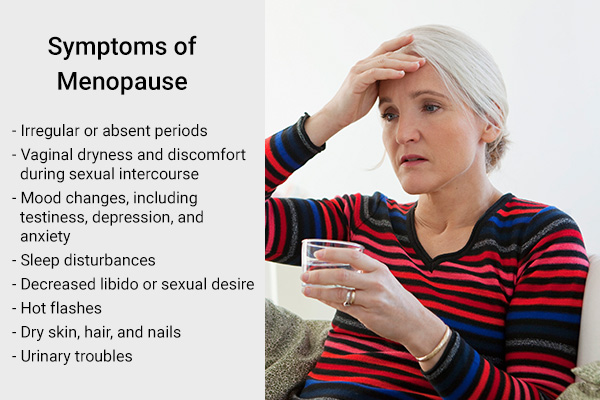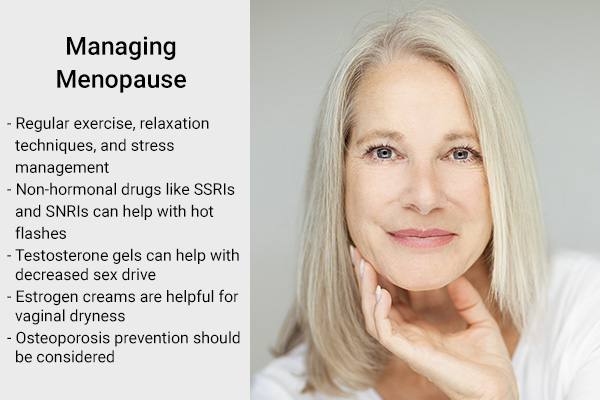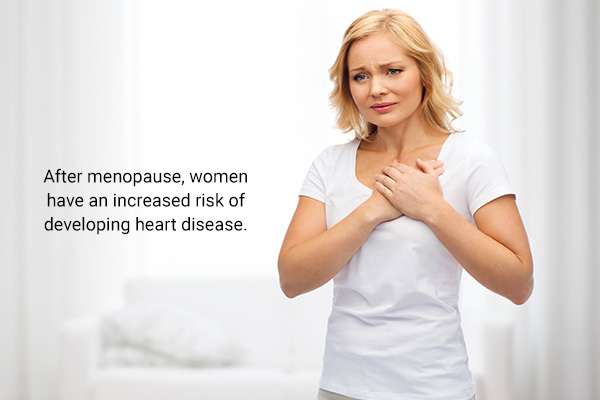In this article:
Menopause (known as amenorrhea) is when a woman’s periods stop happening naturally, due to medical treatment, or due to reduced ovarian function.

Menopause is a natural thing that symbolizes the end of a woman’s reproductive age. It is typically defined as occurring when a female has gone 1 complete year without getting her periods.
Menopause can occur anywhere from the late 40s to early 60s and is associated with a decline in the production of estrogen and progesterone hormones by the ovaries.
This hormonal transition can result in a spectrum of symptoms, including hot flashes, dryness in the vagina, mood changes, sweating at night, and changes in sexual function.
Even though menopause is a natural aspect of aging, females may seek medical treatment for symptom relief. (1)
Read on to know more.
What Causes Menopause?
Menopause usually happens naturally as a result of the aging process and the gradual decline in the function of the ovaries, as mentioned earlier.
As a woman ages, there is a decline in estrogen levels, which causes irregular periods at first followed by a complete stoppage of the menstrual cycle. This hormonal change during menopause can also cause various physical and emotional symptoms that may impact a woman’s quality of life.
Nonetheless, there are therapies known to relieve these signs and support women’s health during and after menopause. (1)
Note: Surgical removal of the ovaries and medical treatments that affect hormone production can also cause early menopause.
Signs and Symptoms of Menopause

The signs and symptoms of menopause can differ from person to person, and some females may suffer from more intense signs and symptoms than others.
The most typical signs and symptoms include:
- Irregular or absent periods
- Vaginal dryness and discomfort during sexual intercourse
- Mood changes, including testiness, depression, and anxiety
- Sleep disturbances
- Decreased libido or sexual desire
- Hot flashes
- Dry skin, hair, and nails
- Urinary troubles
- Joint pain and stiffness
- Night sweats
- Memory issues
- Problems with concentrating
These signs and symptoms are due to the hormonal shifts that happen during menopause, particularly the decline in estrogen levels.
It is significant to note that while menopause can be uncomfortable, it is a biological operation that all females experience after a certain age.
Moreover, various treatments are available to manage menopause and make positive changes in the female’s quality of life, including hormonal treatment, lifestyle changes, and medications. (1)(2)(3)
When Does Menopause Occur?
Studies show that the distribution of menopausal age displays a curve that starts from age 40 years and ends at around the age of 54 years and is generally mostly observed around the ages of 45–55 years. (4)
Treatment for Menopause
Here are some treatment options for menopause:

- Regular exercise, relaxation techniques, and stress management can improve sleep and reduce irritability, while deep breathing may relieve hot flashes.
- Nonhormonal drugs such as SSRIs and SNRIs can help with hot flashes, but the starting dose may be lower than those for depression. (5)
- Testosterone gel can help with decreased sex drive.
- Estrogen cream is helpful for vaginal dryness.
- Osteoporosis prevention should be considered.
- Hormone therapy can be used but should only be initiated by a qualified gynecologist, as the risks often outweigh the benefits, including an increased incidence of breast cancer, stroke, and blood clots. (6)
Complications of Menopause
Menopause can pave the way for the following health concerns.
1. Osteoporosis
Osteoporosis is an ailment that makes the bones fragile and easy to break and thus susceptible to fractures. It occurs when the body loses bone mass faster than it can replace it, leading to a decrease in bone density.
Menopause is a major risk factor for osteoporosis because of the decline in estrogen levels that occurs during this time.
Women typically reach peak bone mass in their late 20s or early 30s. After that, bone density begins to decline gradually. During menopause, however, bone loss accelerates, with women losing up to 5% of their bone mass per year for the first 5–7 years after menopause.
This increased rate of bone loss can cause osteoporosis in a few females.
2. Cardiovascular issues

After menopause, women have an increased risk of developing heart disease. This is because the decline in estrogen levels that occurs during menopause can cause changes in a woman’s blood vessels and cholesterol levels that contribute to the development of heart disease.
Estrogen helps to keep the blood vessels healthy and flexible, so when its levels decrease, blood vessels become stiffer and less able to dilate, increasing the risk of hypertension and other cardiovascular problems.
Additionally, menopausal women may experience an unfavorable lipid profile, with elevated low-density lipoprotein (LDL) cholesterol levels and decreased high-density lipoprotein (HDL) cholesterol levels. These changes can contribute to the development of atherosclerosis and an increased danger of heart attack.
Additionally, hormone replacement therapy (HRT) may be prescribed to help prevent or treat these complications in women at high risk. However, HRT carries some risks, so it’s crucial for ladies to talk about the probable benefits and hazards of this treatment with their healthcare provider. (1)
When to See a Doctor
Menopause is a natural and expected transition in a woman’s life, but it can also bring about uncomfortable symptoms that may require medical attention.
Women should see a doctor if they experience severe symptoms such as frequent and intense hot flashes, vaginal bleeding after menopause, or extreme mood swings that affect their quality of life.
In addition, women with a family history of osteoporosis, heart disease, or breast cancer should talk to their doctor about screening and preventive measures. Finally, any concerns about menopause or its impact on overall health should be discussed with a healthcare provider.
Final Word
Menopause is a natural and inevitable process. It is caused by the decline in estrogen production and can lead to a range of symptoms, including hot flashes, vaginal dryness, mood changes, and sleep disturbances.
However, women can take steps to manage their symptoms and reduce their threat of health problems by maintaining a healthy life, including a steady exercise routine, a balanced diet, and staying away from smoking and disproportionate alcohol use.
Hormone therapy may also be a viable treatment option for some women.
 Continue Reading4 Home Remedies for Menopause
Continue Reading4 Home Remedies for Menopause
- Was this article helpful?
- YES, THANKS!NOT REALLY


